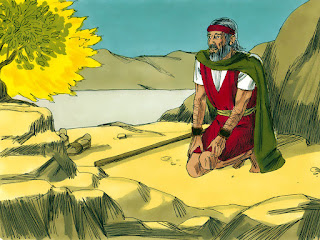JUNIOR
AGE: 10 - 11
YEARS
STANDARD/GRADE:
V & VI
Permission is granted only for
free distribution among Sunday School children.
No part of this document can be
modified, sold or used for any commercial purpose.
LESSON – 7
PHARAOH’S DREAM
In the previous
lesson we had learnt about Jacob’s stay in Haran and his return to his father’s
home. Jacob had 12 sons, eleven of whom were born when he was living in Haran.
His youngest son Benjamin was born when they were travelling back to his father
Isaac’s home. Joseph was the eleventh son of Jacob. Even from a young age
Joseph’s life was much different from his brothers. Joseph saw two dreams which
showed that his brothers would bow before him some day. Joseph’s brothers who
could not understand God’s plan for his life got jealous instead, and they
plotted to murder Joseph. One day they got an opportunity, when Joseph was sent
by their father to see how they were doing. However, they were stopped from
killing him by their eldest brother Reuben. So, they sold Joseph to some
Midianite merchants who took him to Egypt.
In Egypt,
Joseph was sold as a slave to one of Pharaoh’s officials named Potiphar.
Potiphar’s wife falsely accused Joseph of a mistake he did not do and Joseph
was thrown into a prison. God was with Joseph even in prison. Two of Pharaoh’s
workers, his cupbearer and baker, were also in the prison along with Joseph.
One day both of them had dreams and they were troubled. Joseph interpreted
their dreams for them and both interpretations came true. The cupbearer was
restored to his job just as Joseph revealed. Yet, he forgot all about Joseph
until two years later!
In his dream,
Pharaoh was standing on the bank of the Nile River when seven fat, healthy cows
came out of the river and began to graze on the tall reeds growing along the
river. Then seven other cows came out of the Nile River. They looked sickly and
thin. They stood beside the healthy fat cows on the river banks. Then the sickly,
thin cows ate the seven healthy, fat cows. But even after they ate them, no one
could tell that they had done so; the thin cows looked just as thin and sickly
as before. At this point in the dream, Pharaoh woke up. But he fell asleep
again and had a second dream.
In his second
dream Pharaoh saw a healthy stalk of wheat with seven full and beautiful heads
of grain sprouting. Then seven more heads of grain appeared, but these
were blighted, shriveled, and withered by the east wind. And the shriveled
heads swallowed the seven healthy heads. Then Pharaoh woke up and realized that
it was a dream.
In the morning Pharaoh’s
mind was troubled, so he sent for all the magicians and wise men of
Egypt. Pharaoh told them his dreams, but no one could interpret them for him. When
the cupbearer heard about the dream, he remembered Joseph. He told Pharaoh
about Joseph, who was then brought before Pharaoh. Pharaoh asked Joseph to
interpret his dream, since he had heard that Joseph had the gift to interpret
dreams. Joseph answered that only God could explain the meaning of Pharaoh’s
dreams.
Pharaoh
described his dreams to Joseph. Joseph told the Pharaoh that both the dreams
are one and the same. God had revealed to Pharaoh what He was about to do. Joseph
explained that the seven healthy cows and the seven healthy heads of grain
meant that there would be seven years of abundant harvest and plentiful food in
Egypt; the sickly thin cows and the shriveled heads of grain represent seven
years of famine. During the days of famine, all the abundance in Egypt will be
forgotten, and the famine will ravage the land. Joseph also warned Pharaoh that
the matter has been firmly decided by God, and God will do it soon and that was
the reason the dream was given to Pharaoh in two forms.

Joseph saved the
Egyptians from starvation during the severe famine. Joseph’s brothers too came
to Egypt and bowed before him just as Joseph had seen in his dream as a little
boy, when they came to buy food grains for their family. Joseph’s story teaches
us that nothing can stop God’s plan for our lives.
Bible
Reference:
Genesis 39 – 41
Memory verse: Joseph said to them, “Don’t be afraid. Am
I in the place of God? …………………many lives (Genesis 50: 19, 20).
ASSESSMENT
ACTIVITIES
Fill
in the blanks:
1.
The ............................ was restored to his job just as Joseph had
told him.
2. In his dream Pharaoh was standing on the bank of
the ....................... River.
3. The
sickly thin cows represented seven years of .......................
4. Pharaoh changed
Joseph’s name to ..........................................
Give short answers:
1. To whom did the
Ishmaelite traders sell Joseph?
2. Who were with Joseph in
the prison and why were they troubled?
3. What was the idea given
by Joseph to save Egypt?
4. How was Joseph honored
by Pharaoh?
Answer in
brief:
1. Write in brief about Pharaoh’s
dreams.
























